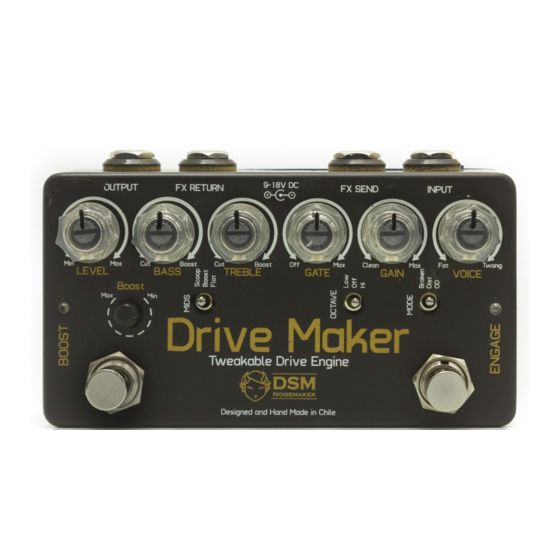
Table of Contents
Advertisement
Quick Links
Advertisement
Table of Contents

Summary of Contents for DSM Noisemaker Drive Maker
- Page 1 ...
- Page 2 Thank you for purchasing the DSM Noisemaker Drive Maker! The most versatile tool for creating your drive tone in a unique way. The Concept behind it: The Drive Maker (DM) was conceived as a response to the current trends on Boutique pedals and recording gear. Only a handful of builders are creating new things, investigating new tones, circuits, functions. Too many TS clones, Big Muffs, Fuzz Faces, Dist +, flood the market. If it is not a cheap clone, is a digital model of a cheap clone. Everyone is starting to sound the same!! We understand that most homeplayers want to sound like their heroes. But that is not the goal of this unit. This is directed to the musician that want to find their own voice, the perfect touch, amount of harmonics, dynamics, and so on. The NAFTA Drive Engine The core of the DM is the NAFTA drive Engine (NAFTA stands for “Not Another Friggin Ts Again”). This engine has been carefully designed to have a huge range of different sounds. It starts with a couple of Opamp stages that define the preemphasis and lowmid gain clipping behavior, after that, CMOS stages introduce tubeamp like feel and smooth clipping. The Gain control balances the gain between each stage so there’s a huge range of clipping behavior available on one turn of the gain knob. From clean, yes, CLEAN sounds, to sparky, crunchy, up to a fuzzed out noisy mess. Main Features Voice control: a unique, carefully designed pregain tone control, tuned from a bass boost at min, a treble boost at max, and flat at the middle. 3 clipping modes: OD for transparent, soft clipping characteristics, DIST for higher gain, more aggressive tones, and BROKEN, for a unique, very asymmetric clipping that responds to your picking style. Octave Up: The MD boasts the sweetest octave up you will find. From Sitar tones to saxlike textures, down to weird fuzzy drives. ...
- Page 3 Boost function: It includes a footswitch activated boost, up to 30dB. Really handy for solos or when you want to push your amp tubes FXloop: An internal FX loop lets you activate your favorite effects just by engaging the Drive maker. Also, it can be assigned for boost channel only. Guitar or Bass use: An internal switch lets you choose between 2 types of output voicings, designed to work with guitar or bass frequencies. ...
- Page 4 CONTROLS: Voice: CW is a treble boost, CCW is a bass boost, flat at the middle. It´s amazing how things change by tweaking the voice knob...want it fuzzy? or sparkly? or twangy? Gain: Goes from clean (yes, "clean" clean) to overdrive, to full out too much gain to control. Gate: For high gain stuff, some gating is a very good thing. It is not a decimator, but it helps a lot... Treble: Boost / cut +10dB Bass: Boost / cut +10dB Level: Output volume. This thing is LOUD. Over noon it will overdrive your amp´s input. WHY? Because you can use it as a clean/mid/bass/treble/TS style boost! Boost: huge boost available (+24dB). Maybe too much so use sparingly... Switches: Mode: OD: Soft clipping, very articulated and transparent. Over noon, it will start behaving as an overdrive into a tube amp (CMOS clipping kicks in) Dist: More Gain and harder clipping, fatter, thicker tones. Broken: Very asymmetric, weird drive. At mid gain it is very bluesy and full of harmonics. At high gain, with powerful pickups, it "chokes" and sounds fuzzy and weird..very unique. Octave: Low: No, it is not a suboctave. It is an octave up effect, but mildly mixed with the signal. This adds Crossover distortion, extra harmonics and a crispy texture. Normal: Octave up off. High: Octave Up fully mixed. It is very sensitive to voicing and mode settings, so there´s a whole world. Even sitar tones. MIDS: Scoop: for metal tones..Scoops 12dB around 700Hz. ...
- Page 5 Internal switches Loop Assign : assigns the FX loop to be activated all the time (while the pedal is engaged), or only when the Boost is engaged (Eg: add some delay to that solo without stepping on 2 pedals) Guitar/Bass: Changes the output EQ. Bass mode cuts some high mids and adds bottom end. You can use either mode really. Whatever sounds best for you. Use a precision screwdriver or something similar to toggle these switches through the holes at the bottom of the pedal. Connections: Input: Yes. Input jack FX send: Send jack for the internal fx loop FX Return: Yes, exactly, you can leave the Send empty and use the return as an insert (Eg: a parallel compressed clean signal?) Output: Of course.. DC Jack: Center Negative, 40mA. You can power it up from 9V to 18V for more headroom, and different dynamics. ...
- Page 6 Sample settings For Guitar ...
- Page 7 SAMPLE SETTINGS FOR BASS ...

Need help?
Do you have a question about the Drive Maker and is the answer not in the manual?
Questions and answers